Loose motion, or diarrhea, in dogs is a common ailment that pet parents frequently encounter. While it might appear as a minor upset at first, prolonged or severe episodes of diarrhea can indicate more serious underlying health issues within a dog’s digestive system. Understanding the various causes, knowing what actions to take, and recognizing when professional veterinary help is crucial can significantly impact your dog’s recovery and overall well-being. This guide will delve into effective management strategies and the role of appropriate Dog Medicine For Loose Motion, emphasizing safe and informed care.
Understanding the Common Causes of Loose Motion in Dogs
Diarrhea in dogs can stem from a multitude of factors, ranging from simple dietary mishaps to complex medical conditions. Identifying the potential cause is the first step toward effective treatment.
Dietary Indiscretion and Changes
One of the most frequent culprits behind sudden loose motion is a dog’s adventurous palate.
- Eating spoiled food, garbage, or non-food items: Dogs are notorious for scavenging. Ingesting rotten food, foreign objects like socks or toys, or even just unusual items from the trash can lead to severe stomach upset and diarrhea, often termed “garbage toxicosis.”
- Sudden dietary changes or food intolerance: Abruptly switching dog food brands or rapidly transitioning puppies from milk to solid food can disrupt their delicate digestive system. Their gut needs time to adjust to new proteins and ingredients. Similarly, some dogs may have intolerances to lactose, gluten, or specific proteins, manifesting as digestive upset.
Parasitic Infections
Intestinal parasites are a widespread cause of loose motion, particularly in puppies or dogs not on a regular deworming schedule.
- Worms (roundworms, hookworms) and protozoa (Giardia, Coccidia): These microscopic organisms can irritate the intestinal lining, leading to chronic or intermittent diarrhea, sometimes with blood or mucus. Regular deworming and fecal tests are essential preventive measures.
Bacterial and Viral Infections
Pathogens can also wreak havoc on a dog’s digestive health.
- Bacterial infections: Consuming contaminated water or raw meat can expose dogs to bacteria like Salmonella or E. coli, resulting in acute watery diarrhea, vomiting, and abdominal pain, often requiring antibiotic treatment.
- Viral infections: Unvaccinated puppies are particularly vulnerable to highly contagious and severe viruses such as Parvovirus, Distemper, and Coronavirus. These can cause life-threatening bloody diarrhea and require immediate veterinary hospitalization for intensive care and fluid therapy.
Stress and Anxiety
Emotional well-being is closely linked to digestive health in dogs.
- Stress-induced colitis: Environmental stressors like travel, loud noises (fireworks, thunderstorms), boarding, or significant changes in routine can trigger anxiety, leading to temporary loose motion and stomach upset. This condition, known as stress-induced colitis, typically resolves once the stressor is removed.
Underlying Chronic Illnesses
Persistent or recurrent loose motion can be a red flag for more serious health issues.
- Organ diseases: Conditions affecting the liver, kidneys, or pancreas can manifest with chronic diarrhea.
- Inflammatory Bowel Disease (IBD): This chronic condition involves inflammation of the digestive tract, leading to ongoing loose motion, weight loss, and vomiting. Persistent diarrhea always warrants thorough veterinary testing.
Medication Side Effects
Even beneficial medications can sometimes cause digestive upset.
- Antibiotics: While crucial for treating bacterial infections, antibiotics can disrupt the natural balance of beneficial bacteria in a dog’s gut flora, leading to temporary diarrhea or soft stools. Probiotics are often recommended to help restore healthy digestion after antibiotic use.
- Other medications: Certain drugs, though less commonly, can also have gastrointestinal side effects.
Toxins, Poisons, and Foreign Bodies
- Toxic substances: Common household items and foods like onions, garlic, chocolate, raisins, and certain artificial sweeteners (xylitol) are toxic to dogs. Ingesting even small amounts can cause severe vomiting, diarrhea, or life-threatening poisoning.
- Poisonous plants: Many common indoor and outdoor plants (e.g., aloe, dieffenbachia, oleander) can irritate a dog’s gut, leading to severe loose motion. Keep all potentially harmful substances out of your pet’s reach.
- Swallowing foreign objects: If a dog swallows an indigestible item like a sock, toy piece, or bone, it can cause an intestinal blockage. This can lead to vomiting, lethargy, loss of appetite, and diarrhea, often requiring urgent veterinary attention and diagnostic imaging for safe removal.
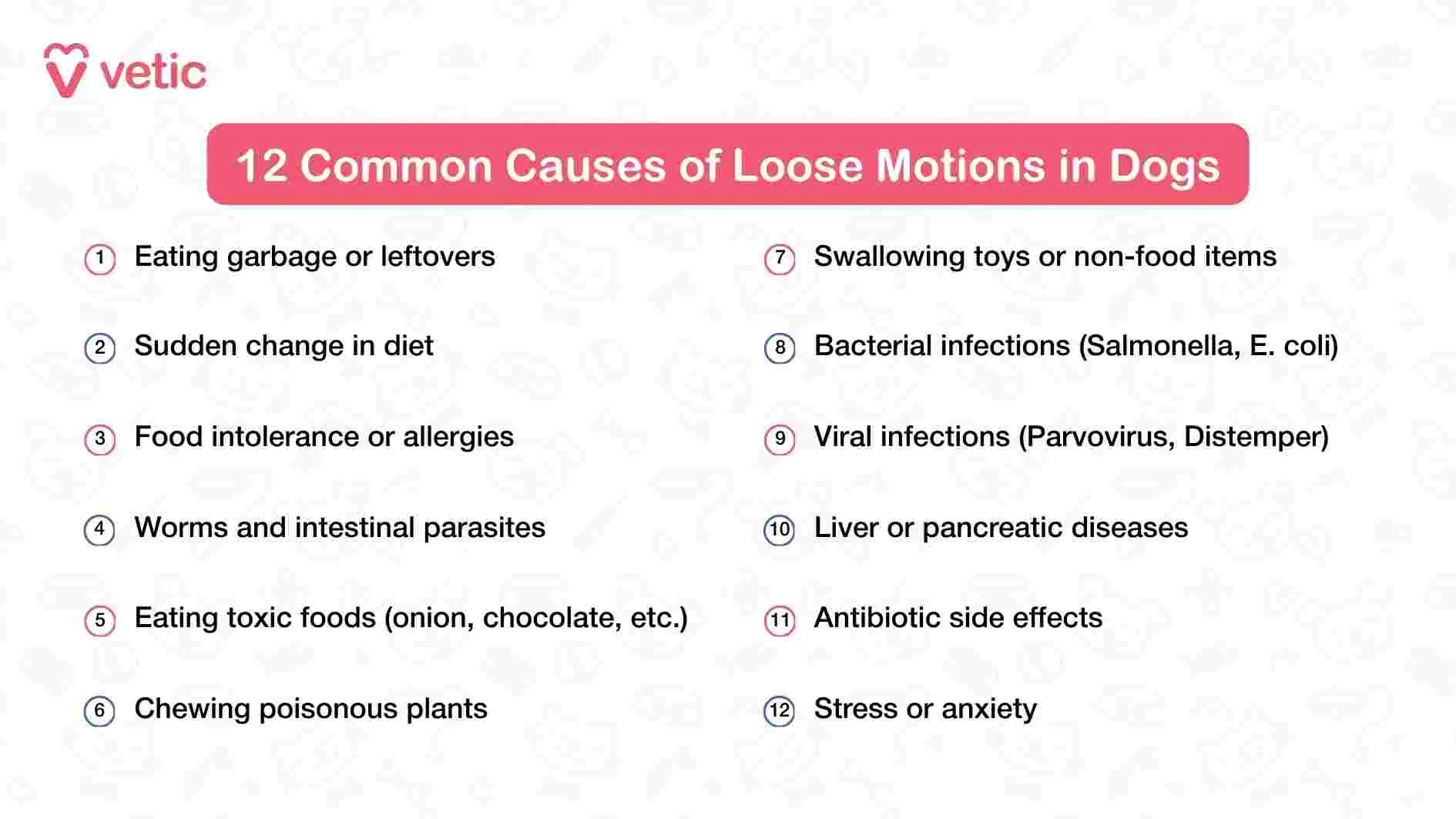 Common causes of loose motion in dogs, including dietary changes, parasites, and stress
Common causes of loose motion in dogs, including dietary changes, parasites, and stress
When to Seek Veterinary Care for Dog Diarrhea
While mild, short-lived loose motion might resolve with home care, it’s always best to consult a veterinarian as soon as diarrhea begins, especially for puppies, senior dogs, or those with pre-existing health conditions. Early intervention can prevent rapid progression of symptoms and more severe health consequences. If you notice persistent or severe issues, it’s crucial to seek professional advice regarding appropriate medicine for dog loose motion.
Immediate Vet Visit Checklist:
Contact your veterinarian immediately if your dog displays any of the following symptoms:
- Continuous vomiting or refusal to eat for more than 24 hours.
- Lethargy, weakness, collapse, or unusual behavior.
- Blood (bright red or black, tarry streaks) or mucus in the stool.
- High fever or visible abdominal pain (hunched posture, whining when touched).
- Signs of dehydration: sunken eyes, dry or sticky gums, loss of skin elasticity (skin tenting), dry nose.
- Significant weight loss or abdominal bloating.
- If diarrhea lasts more than 24 hours despite home care.
- If your dog has underlying diseases such as diabetes, kidney disease, or liver issues.
- If your pet is very young (puppy) or very old (senior dog), as they are more vulnerable to dehydration and complications.
Delaying treatment can lead to severe dehydration, electrolyte imbalances, and other life-threatening complications that may require intensive intravenous (IV) fluid therapy and hospitalization.
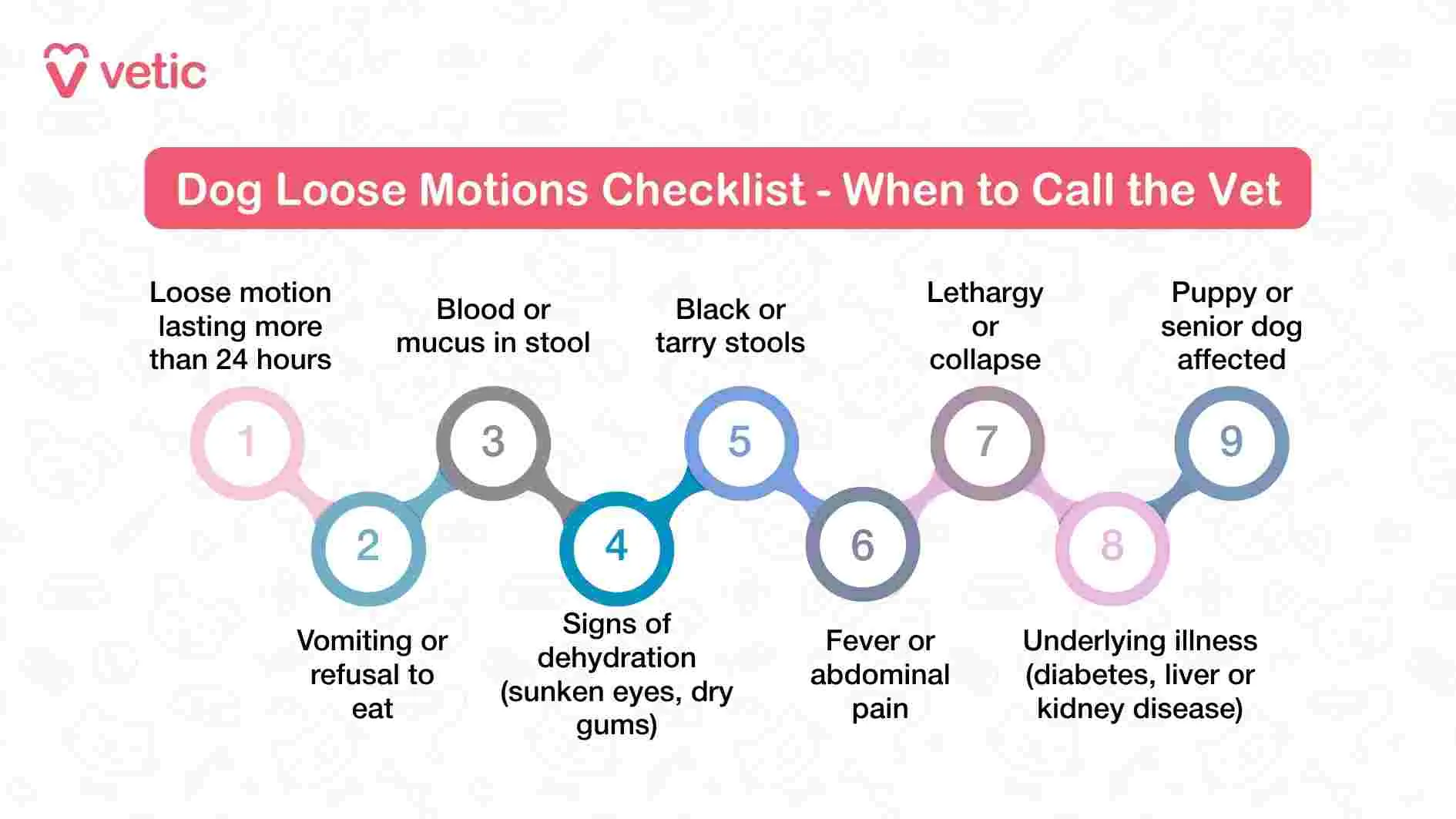 Checklist of severe dog diarrhea symptoms indicating when to call the vet, including vomiting and lethargy
Checklist of severe dog diarrhea symptoms indicating when to call the vet, including vomiting and lethargy
Dog Medicine for Loose Motion: What Your Vet Might Prescribe
It is paramount to always consult a veterinarian before administering any medication to your dog. Many medications, even those familiar from human use, differ significantly in safe dosages and formulations for dogs and can cause serious harm if misused. Your veterinarian will diagnose the underlying cause and recommend the most appropriate anti diarrhea prescription medicine for dogs.
Probiotics and Prebiotics
These supplements are often recommended to restore the balance of beneficial bacteria in your dog’s gut, especially after antibiotic use or during mild digestive upset.
- Probiotics: Contain live beneficial bacteria that help normalize intestinal flora and improve digestive function.
- Prebiotics: Are non-digestible food ingredients that stimulate the growth and activity of beneficial bacteria.
- Note: Ensure you use dog-specific formulations, as human probiotics may not be suitable.
Anti-Diarrheal Medications
Veterinarians may prescribe specific anti-diarrheal suspensions or tablets designed for canine use to help firm up stool and reduce frequency. These work by slowing down gut motility or absorbing toxins. Common examples include:
- Kaolin-Pectin: Helps absorb toxins and coats the intestinal lining.
- Bismuth Subsalicylate (e.g., Pepto-Bismol): Can be used very cautiously and only under veterinary guidance, as it contains salicylates which can be toxic to some dogs, especially cats. Never give without vet approval.
- Metronidazole (Flagyl): An antibiotic with anti-inflammatory properties often used for certain types of diarrhea and Giardia infections.
- Tylosin: An antibiotic sometimes used for chronic diarrhea or IBD.
Antibiotics and Anti-Parasitics
If an infection (bacterial, protozoal, or parasitic worms) is confirmed through diagnostic tests (like stool or blood tests), your vet will prescribe targeted dog medicine for loose motion.
- Antibiotics: For bacterial infections (e.g., Metronidazole, Amoxicillin).
- Anti-parasitic drugs: For worms (e.g., Fenbendazole, Pyrantel) or protozoa (e.g., Metronidazole for Giardia, Sulfadimethoxine for Coccidia).
- Warning: Never give human antibiotics or anti-parasitics without veterinary supervision. Incorrect dosing can lead to resistance or serious side effects. For tips on getting dogs to take pills, consult our guide for helpful techniques.
Oral Rehydration Solutions
Diarrhea can quickly lead to dehydration. Your vet might recommend oral rehydration salts or solutions specifically formulated for dogs to replenish lost fluids and electrolytes. This is especially important if your dog is not drinking enough water.
Important Warning: Never Self-Medicate
Resist the urge to give your dog human medications like Imodium (loperamide) or other over-the-counter drugs without explicit veterinary advice. These can be toxic, worsen the condition, or mask serious symptoms, delaying appropriate diagnosis and treatment. Always rely on vet-prescribed dog loose motion medicine. Even certain chewable flea and tick meds for dogs can sometimes cause mild digestive upset, so always monitor your dog after starting new treatments. If your dog is also experiencing itching, be aware that allergy pills for dogs itching are a separate consideration and should not be confused with or used for digestive issues without vet advice.
What to Feed a Dog with Loose Motion
When your dog is experiencing diarrhea, their intestines are irritated and inflamed. Gentle, bland meals can help soothe their stomach and prevent further irritation while supporting recovery.
Start by withholding solid food for 12 to 18 hours (unless your vet advises against it, especially for very young or old dogs). This allows the digestive system to rest and recover. During this fast, ensure constant access to clean, fresh water.
Bland Diet Recommendations:
Once your vet approves resuming food, gradually reintroduce easy-to-digest options in small, frequent portions:
- Plain boiled chicken: Boneless, skinless chicken breast, boiled until cooked through. Shred it into small pieces.
- White rice: Plain, boiled white rice (not brown rice, which has more fiber and can be harder to digest during diarrhea).
- Pumpkin puree: Plain, unsweetened canned pumpkin (not pumpkin pie filling). It’s rich in soluble fiber, which helps absorb excess water and firm up stools. Start with small amounts.
- Boiled potatoes: Plain boiled potatoes, mashed or cut into small pieces.
- Unsweetened yogurt: A small amount of plain, unsweetened yogurt (without artificial sweeteners like xylitol) can introduce beneficial bacteria, but some dogs are lactose intolerant, so introduce cautiously.
Offer small, frequent meals (3-4 times a day) instead of one large portion to avoid overwhelming their sensitive stomach. Avoid treats, milk, fatty, or oily foods, and table scraps during this time, as they can exacerbate symptoms.
Hydration is Key:
Ensure your dog has constant access to clean, cool water. If they are reluctant to drink or seem dehydrated, your vet may recommend specific veterinary oral rehydration solutions to help replenish lost fluids and electrolytes.
If your dog vomits after eating bland food or continues to have watery stool, stop feeding and consult your vet immediately.
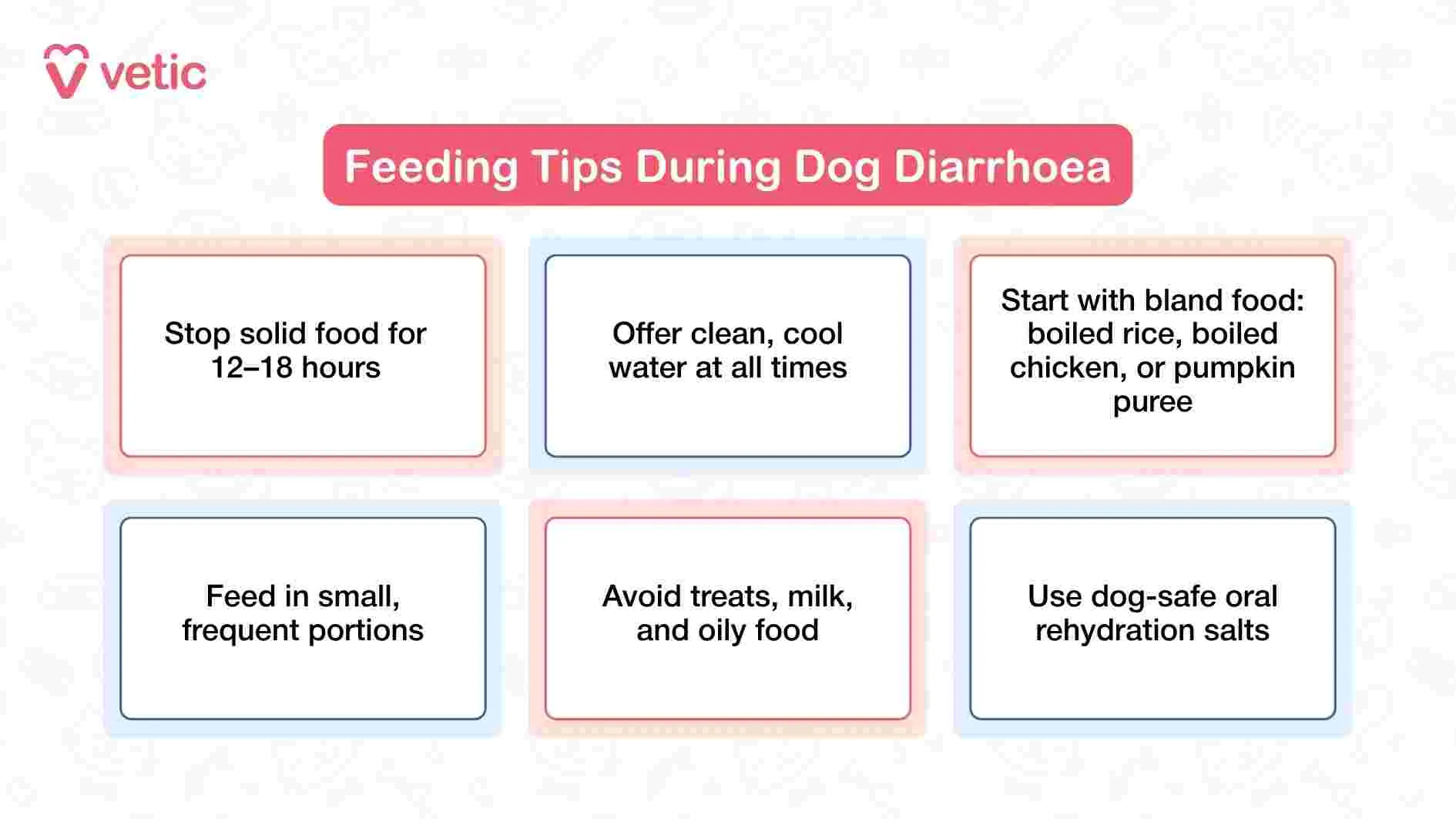 Infographic showing bland diet feeding tips for a dog with diarrhea, such as boiled chicken and rice
Infographic showing bland diet feeding tips for a dog with diarrhea, such as boiled chicken and rice
Decoding Your Dog’s Poop Color: A Health Indicator
The color and consistency of your dog’s loose motion can provide valuable clues about what might be happening inside their digestive tract. While veterinarians conduct thorough analyses, understanding these basic indicators can help you provide crucial information to your vet.
White Spots in the Poop
- Meaning: Often indicates the presence of intestinal worms or their eggs in the stool.
- Action: Consult your vet for a deworming schedule and appropriate treatment.
Green Dog Poop
- Meaning: Could mean your dog ate a lot of grass or plants, or ingested a mild toxin. It can also be a sign of bile imbalance or rapid transit through the digestive system (not enough time for bile to break down).
- Action: If diarrhea persists, or if accompanied by other symptoms, contact your vet for testing.
Yellow or Orange Dog Poop
- Meaning: May suggest issues with the liver or gallbladder, or a bacterial infection. If the stool is also foul-smelling and slimy, it strongly points to a digestive upset or infection.
- Action: A vet visit for tests (e.g., blood work, fecal analysis) is recommended.
Black and Tarry Dog Poop
- Meaning: This is a serious sign, often indicating bleeding in the upper gastrointestinal (GI) tract (stomach or small intestine). The blood has been digested, giving it a dark, tarry appearance.
- Action: This is a medical emergency requiring immediate veterinary attention.
Brown Dog Poop with Red Streaks
- Meaning: Indicates fresh bleeding from the lower intestines, colon, or rectum. This can be caused by inflammation, repeated straining, colitis, or polyps.
- Action: While less immediately critical than black tarry stool, it still warrants a vet visit to diagnose and treat the cause.
Grey and Greasy Dog Poop
- Meaning: Often linked to pancreatic or biliary disease, where fat digestion is impaired. The stool may appear bulky, greasy, and have a strong, foul odor due to undigested fat.
- Action: Veterinary consultation is necessary to investigate pancreatic or liver function.
If your dog’s stool color remains abnormal for more than a day, or if you notice any concerning changes, collect a fresh stool sample and take it to your vet for analysis.
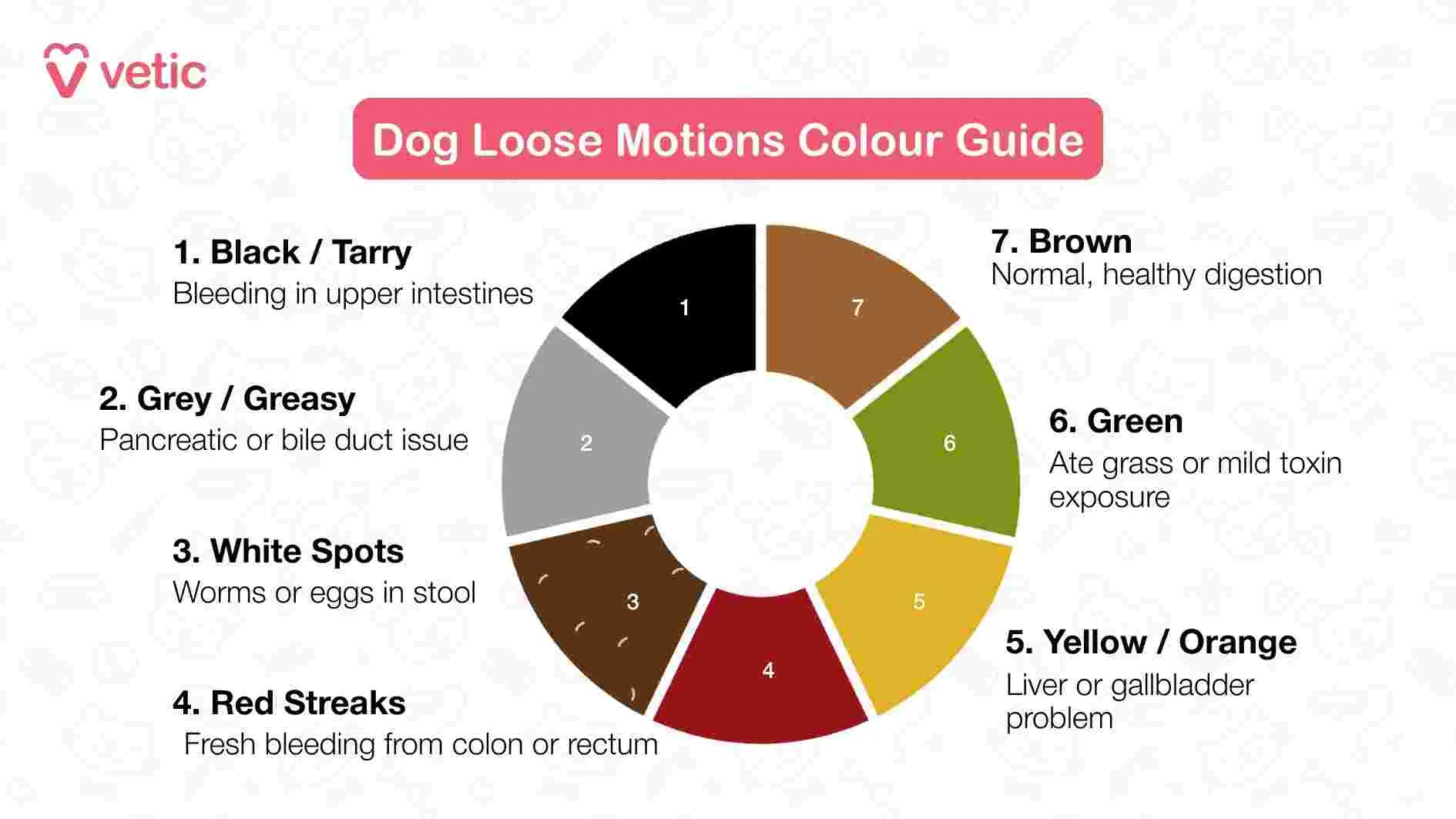 Circular chart explaining what different dog poop colors mean for health, from normal brown to black tarry stools
Circular chart explaining what different dog poop colors mean for health, from normal brown to black tarry stools
Preventing Future Episodes of Loose Motion in Dogs
Proactive care and a watchful eye can significantly reduce the frequency and severity of loose motion in your dog.
Routine Deworming and Vaccinations
- Regular deworming: Follow your veterinarian’s recommended deworming schedule, especially for puppies, to prevent parasitic infections.
- Annual vaccinations: Keep your dog’s vaccinations up-to-date to protect them from viral diseases like Parvovirus and Distemper, which are major causes of severe diarrhea.
Dietary Management
- Gradual food transitions: Introduce any new dog food gradually over 7-10 days, mixing increasing amounts of the new food with decreasing amounts of the old food.
- Avoid table scraps and human food: Many human foods are difficult for dogs to digest or can be toxic. Stick to a balanced, high-quality dog food.
- Prevent scavenging: Secure trash cans and supervise your dog outdoors to prevent them from eating spoiled food, garbage, or other harmful items.
- Proper food storage: Store dog food properly to prevent spoilage and contamination.
Safe Environment
- Eliminate toxins: Keep all household chemicals, medications, human foods, and poisonous plants out of your dog’s reach.
- Regular cleanup: Promptly clean up any spills or messes, especially if multiple pets are in the household, to prevent the spread of infections.
- Fresh water access: Always ensure your dog has access to clean, fresh water to promote good digestion and prevent dehydration.
Stress Reduction
- Minimize stressors: Identify and minimize sources of stress for your dog, such as loud noises or prolonged separation.
- Maintain routine: Dogs thrive on routine. Try to keep feeding times, walk times, and daily schedules consistent.
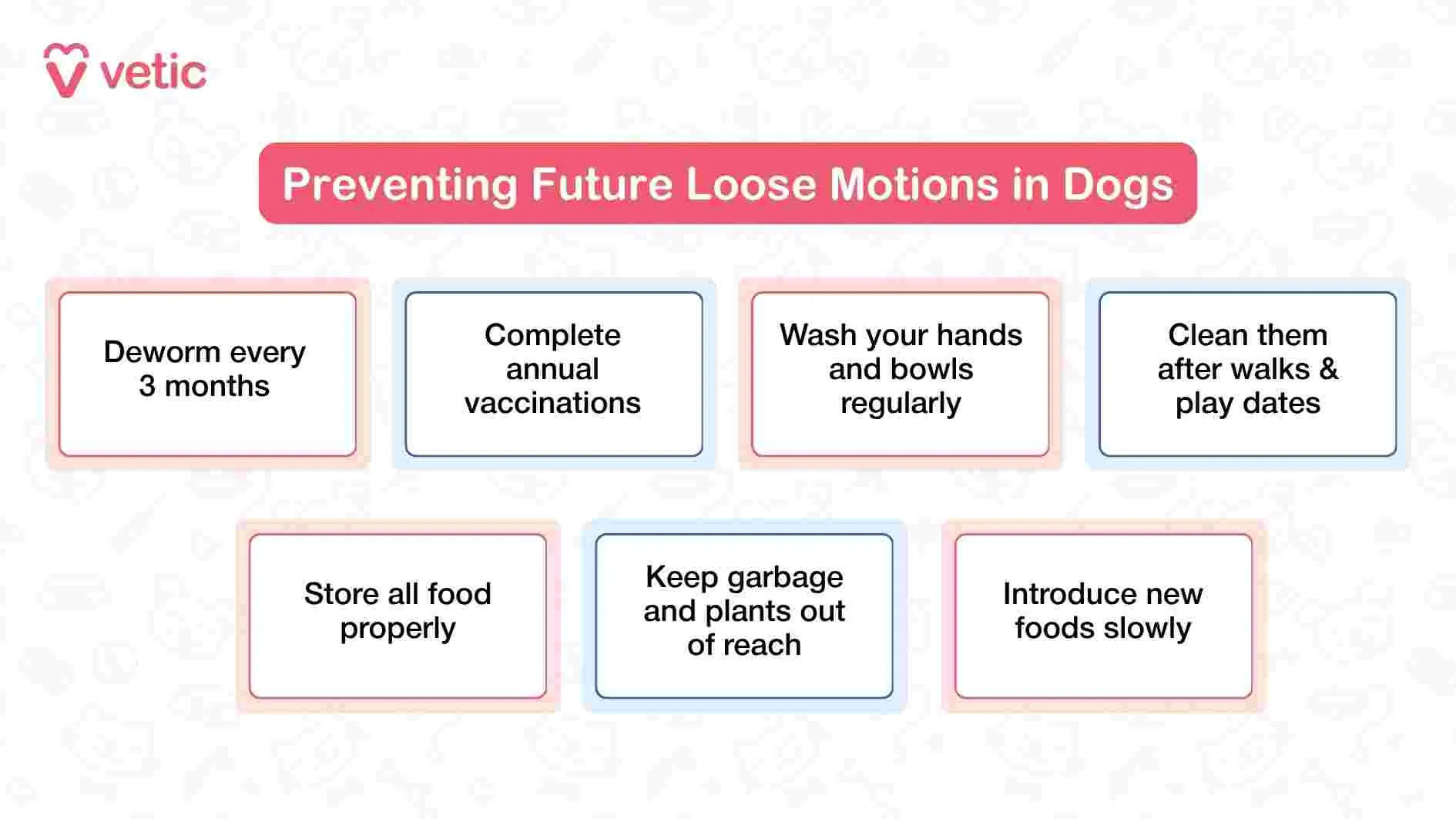 Visual guide to preventing future loose motion in dogs, featuring tips like routine deworming and proper food storage
Visual guide to preventing future loose motion in dogs, featuring tips like routine deworming and proper food storage
Conclusion
Loose motion in dogs can range from a minor tummy upset to a symptom of a serious, life-threatening disease. As responsible pet parents, it’s crucial to always observe changes in stool color, texture, and frequency, and to never attempt to self-medicate your dog without professional veterinary advice. A quick and informed response, ensuring plenty of fluids, offering a bland diet, and seeking timely medical care can significantly aid your furry friend in bouncing back to health faster. Always consult your veterinarian for an accurate diagnosis and the most appropriate dog medicine for loose motion to ensure your pet receives the best possible care.
FAQs About Dog Loose Motion and Treatment
What can cause loose motions in dogs suddenly?
Sudden loose motion is frequently caused by dietary indiscretion (eating spoiled food or trash), sudden dietary changes, exposure to toxins, parasites, or acute bacterial/viral infections.
How long does dog diarrhea usually last?
Mild diarrhea often resolves within 24 to 48 hours with appropriate home care. However, if it persists beyond this timeframe, or if it’s bloody, severe, or accompanied by other symptoms, immediate veterinary care is essential.
Can I give human medicine for treating my dog’s loose motion?
No, human medicines are generally unsafe for dogs and can often worsen their condition or cause severe toxicity. Always use vet-prescribed dog medicine for loose motion and never administer human medications without explicit veterinary guidance.
What home remedies help with loose motions in dogs?
For very mild cases, bland foods like plain boiled chicken, white rice, or pumpkin puree can help soothe the gut. Ensure constant access to fresh water. However, if diarrhea is persistent or severe, contact your vet immediately instead of relying solely on home remedies.
Can stress cause loose motion in dogs?
Yes, dogs can experience stress-induced colitis, leading to diarrhea during stressful events such as travel, loud noises (fireworks), or major changes in their environment or routine.
When should I worry about dog diarrhea?
You should worry and contact your vet if diarrhea is accompanied by vomiting, lethargy, fever, abdominal pain, blood or black streaks in stool, signs of dehydration, or if it lasts for more than 24 hours. Puppies and senior dogs require immediate attention.
How do I prevent loose motion in my dog?
Prevention strategies include keeping vaccinations and deworming up to date, avoiding raw or spoiled food and table scraps, introducing new diets gradually, and ensuring your dog does not have access to garbage or toxic substances.
What is the best dog medicine for loose motion?
The most effective dog medicine for loose motion depends entirely on the underlying cause. It can range from probiotics to anti-parasitics, antibiotics, or specific anti-diarrheal agents. Some cases may also require fluid therapy for rehydration. Only your veterinarian can accurately diagnose the problem and prescribe the most appropriate treatment.
